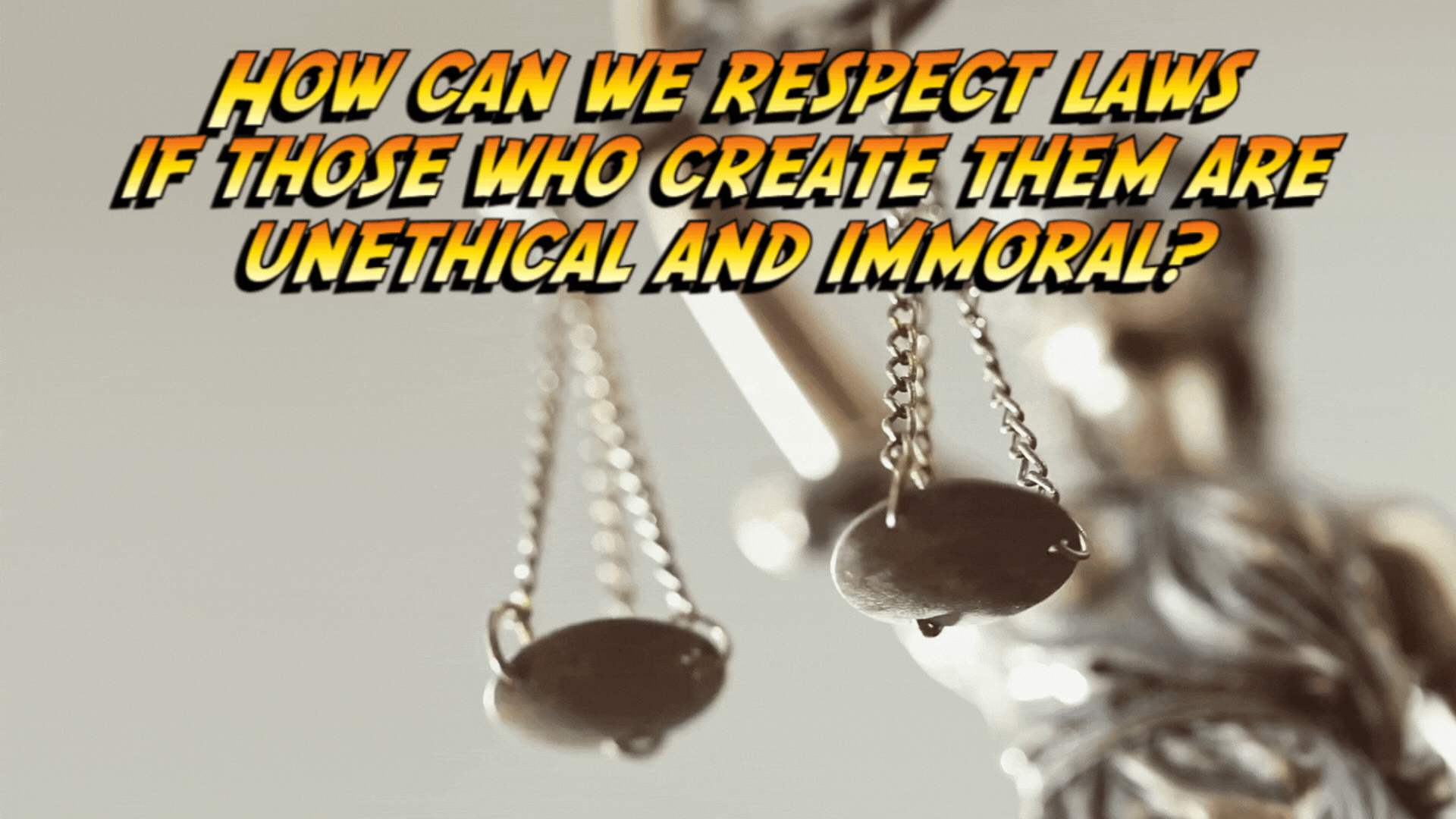[EN]

Laws are fundamental for a society to live in a fair and equitable manner. Imagine a place where there are no rules and where everyone can do whatever they want. This would result in utter chaos, with people stealing, appropriating other people's property, committing murder, among other harmful actions. Certainly, no one would want to live in such an environment.
Therefore, a society must be governed by clear laws that are accessible and understood by all. Laws establish rights, duties, and obligations, promoting mutual respect and allowing for harmonious coexistence, with security and predictability.
But who creates the laws in our countries? In Brazil, for example, the responsibility for drafting laws lies with the Legislative Branch, composed of deputies and senators. These figures represent the government and, unfortunately, where there is government action, there is often corruption. Frequently, these parliamentarians create laws for their own benefit or to favor interest groups, such as lobbyists. It is not uncommon for them to approve, in record time, bills that increase their salaries or guarantee personal advantages, while proposals that would benefit the population end up stuck in long bureaucratic processes, until they lose their validity or are forgotten.
When those who create laws lack ethical or moral standards, society itself becomes fragile. After all, if those who legislate do not set an example, how can we expect the population to obey the laws with integrity? Laws would be more effective if their creators were ethical, moral, and committed to the common good. Thus, society would have greater confidence in the rules and would respect those who represent them more.
In Brazil, the culture of corruption is deeply rooted. Many people, realizing that politicians, who enjoy high salaries and privileges, commit illegal acts without punishment, end up adopting the same attitude, taking advantage of loopholes and opportunities for their own benefit, with the false sense that they will not be held accountable.
A clear example of this occurs in the social benefits system. Brazil, as a socialist-oriented country, offers financial assistance to vulnerable families. However, it is common for people who do not meet the established criteria to benefit from these policies. Many women, for example, although they live with their partners, do not formalize their marriage in order to register as single mothers and thus receive more assistance. Other people avoid formal employment for fear of losing their benefits. This behavior creates a vicious cycle in which the more someone appears to live in poverty, the more benefits they receive.

Such programs should be temporary instruments, designed to help individuals until they achieve autonomy, study, and enter the labor market. Unfortunately, most beneficiaries prefer to remain in the same situation, dependent on the government, without seeking personal or professional growth. Receiving benefits improperly is, therefore, an unethical and immoral practice.
Unfortunately, the situation in the country is worrying. Corruption is present at all levels, both among those at the top of the social pyramid, the politicians, and among those at the bottom. In the middle of this structure is the middle class, which, in addition to paying high taxes, supports the privileges of the elite and the benefits intended for the most vulnerable classes.
This model is unsustainable in the long term. One day this pyramid may collapse, because those who sustain it, the middle class, are being overburdened. Without profound structural and cultural changes, both in the behavior of government officials and the population, the social and economic system will become increasingly fragile.
If you've made it this far, thank you very much for your time, and if this content was useful in any way, please upvote and reblog!

[PT]

As leis são fundamentais para que uma sociedade viva de forma justa e isonômica. Imagine um lugar onde não existam regras e onde cada pessoa possa fazer o que bem entender. Isso resultaria em um verdadeiro caos, pessoas poderiam roubar, se apropriar dos bens alheios, cometer homicídios, entre outras ações prejudiciais. Certamente, ninguém gostaria de viver em um ambiente assim.
Por isso, uma sociedade deve ser regida por leis claras, acessíveis e compreendidas por todos. As leis estabelecem direitos, deveres e obrigações, promovendo o respeito mútuo e permitindo uma convivência harmoniosa, com segurança e previsibilidade.
Mas quem cria as leis em nossos países? No Brasil, por exemplo, a responsabilidade pela elaboração das leis é do Poder Legislativo, composto por deputados e senadores. Essas figuras representam o governo e, infelizmente, onde há atuação governamental, muitas vezes também há corrupção. Frequentemente, esses parlamentares criam leis para benefício próprio ou para favorecer grupos de interesse, como lobistas. Não é raro que aprovem, em tempo recorde, projetos que aumentam seus salários ou garantem vantagens pessoais, enquanto propostas que beneficiariam a população acabam emperradas em longos processos burocráticos, até perderem a validade ou serem esquecidas.
Quando aqueles que criam as leis não possuem senso ético ou moral, a própria sociedade se fragiliza. Afinal, se quem legisla não dá exemplo, como esperar que a população obedeça às leis com integridade? As leis seriam mais eficazes se seus criadores fossem pessoas éticas, morais e comprometidas com o bem comum. Assim, a sociedade teria maior confiança nas normas e respeitaria mais aqueles que as representam.
No Brasil, a cultura da corrupção está profundamente enraizada. Muitas pessoas, ao perceberem que políticos, detentores de altos salários e privilégios, cometem atos ilícitos sem sofrerem punições, acabam adotando a mesma postura, aproveitam-se de brechas e oportunidades para benefício próprio, com a falsa sensação de que não serão responsabilizadas.
Um exemplo claro disso ocorre no sistema de benefícios sociais. O Brasil, como país de orientação socialista, oferece auxílios financeiros para famílias em situação de vulnerabilidade. No entanto, é comum que pessoas que não se enquadram nos critérios estabelecidos se beneficiem dessas políticas. Muitas mulheres, por exemplo, embora vivam com seus companheiros, não oficializam o casamento para se cadastrarem como mães solo e, assim, receberem mais auxílios. Outras pessoas evitam trabalhar formalmente, com receio de perder os benefícios. Esse comportamento cria um ciclo vicioso, no qual quanto mais alguém aparenta viver em situação de miséria, mais benefícios recebe.

Tais programas deveriam ser instrumentos temporários, destinados a ajudar os indivíduos até que conquistem autonomia, estudem e ingressem no mercado de trabalho. Infelizmente, grande parte dos beneficiários prefere permanecer na mesma situação, dependente do governo, sem buscar crescimento pessoal ou profissional. Receber benefícios de maneira indevida é, portanto, uma prática desprovida de ética e moral.
Infelizmente, a situação do país é preocupante. A corrupção está presente em todos os níveis, tanto entre os que ocupam o topo da pirâmide social, os políticos, quanto entre os que estão na base. No meio dessa estrutura está a classe média, que, além de arcar com altos impostos, sustenta os privilégios da elite e os benefícios destinados às classes mais vulneráveis.
Esse modelo é insustentável a longo prazo. Um dia essa pirâmide poderá ruir, pois quem a sustenta, a classe média, está sendo sobrecarregada. Sem mudanças estruturais e culturais profundas, tanto no comportamento dos governantes quanto da população, o sistema social e econômico se tornará cada vez mais frágil.
Se chegou até aqui muito obrigado pelo seu tempo e se de alguma forma este conteúdo foi útil, deixe seu upvote e reblog!

Posted Using INLEO

Obrigado por promover a comunidade Hive-BR em suas postagens.
Vamos seguir fortalecendo a Hive
The truth is just clear, where there is government there's corruption truly and I know it's in every country.
We as humans should know and so what's is right and avoid wrong doing, that's the way to live
Human nature is corruptible. Even if there are a few who act correctly, there will be hundreds who will act wrongly or even cause the few who are correct to change sides!
That's right, how can we respect the law if the person who makes it doesn't have ethics and morals?
Do as I say, but don't do as I do. That's a popular dictator who sums it up well!
Aí você tocou num num ponto delicado e fundamental no estabelecimento das leis: a falta de moral e ética dos legisladores. Tipo o que está acontecendo no que diz respeito ao Licenciamento no Brasil, permitindo todo o tipo de imoralidade, à despeito da lei...
!HUG
!INDEED
!WRD